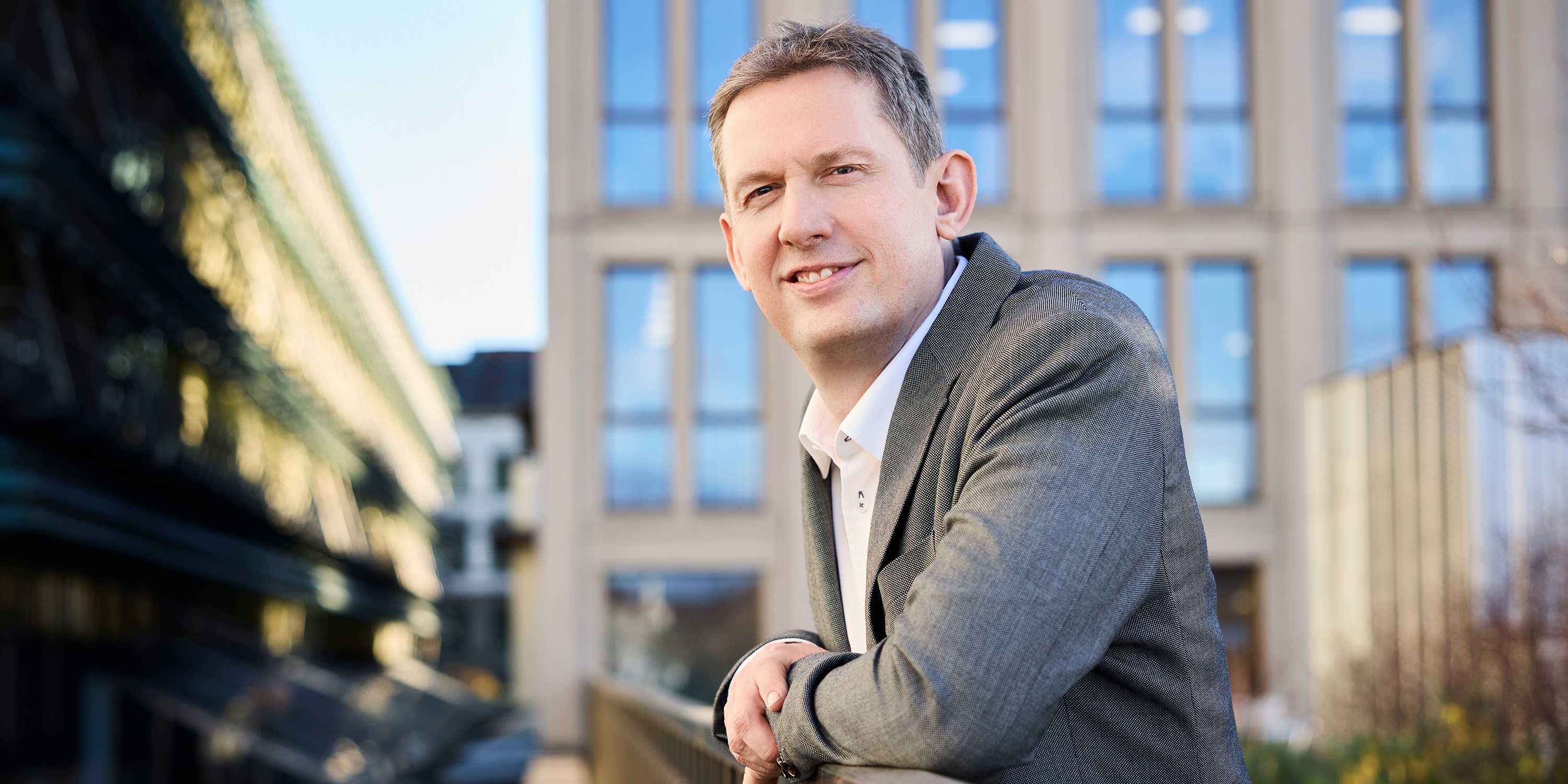The ETH Board has appointed Christian Wolfrum as Vice President for Research at ETH Zurich effective 1 January 2023. In his roles as Professor of Translational Nutritional Biology, Director of Studies and Associate Vice President for Medicine, Wolfrum has actively shaped medical teaching and research at the university.

Christian Wolfrum’s interest in the natural sciences began early on while he was still at school. His first love was chemistry. It wasn’t so much the regular lessons that piqued his curiosity, but rather his participation in a Chemistry Olympiad. One thing in particular that fired his enthusiasm for the subject was chaos theory, which was popular in the 1980s, along with its chaotically oscillating chemical reactions. Since his school lacked the necessary reagents to replicate the experiments, he and his friends enquired at a German chemical and pharmaceutical company and promptly obtained substances at a level of quality they would never have hoped for. They used these to carry out their experiments. “In the process, I discovered what makes science exciting and how experiments lead to new discoveries,” he recalls.
Today, Wolfrum works in biomedicine, an interdisciplinary field of research that combines experimental medicine with methods from molecular biology and cell biology. He has been teaching and researching in this field as a professor at ETH Zurich since 2008. He also heads the Laboratory of Translational Nutritional Biology and serves as the Director of Studies for the Health Sciences and Technology degree programme as well as for the Bachelor’s degree in Human Medicine, which he helped to establish.
In addition, he has been the Executive Board’s Associate Vice President for Medicine since 2020. “In that role, he has actively helped to strengthen collaboration in teaching, research and translation in medicine and has worked to promote and merge various health initiatives,” says Joël Mesot, ETH President, in praise of the future Vice President for Research. “I’m pleased with external page the ETH Board’s choice, as I feel certain that Christian Wolfrum has the right skills, experience and commitment to oversee research at ETH Zurich. He’s also an ideal addition to the governing body of our university with respect to his field of expertise.”
An interest in the fundamentals of disease
Wolfrum received his basic scientific education, up to and including a doctorate in biochemistry, at the University of Münster. When he first encountered it, biochemistry was a purely basic science, closer in content to chemistry than to biology, that described the physical and chemical processes that enable organisms to live.
These include physical processes, such as how the body converts food into energy and stores it to use later for other processes. In addition, many diseases can be traced back to problems in biochemical processes. When Wolfrum realised that his interest lay in the fundamentals of disease, he went to The Rockefeller University in New York as a postdoctoral fellow. “That’s where I acquired my physiological and biological knowledge,” he says. “I looked at metabolic diseases such as obesity and type 2 diabetes and examined which molecular processes are incorrectly regulated in these diseases.”
Research with a human connection
At ETH Zurich, Wolfrum’s interest ultimately settled on the molecular basis of how fat cells form and how metabolic diseases develop. Today, the focus of his research is still on obesity and two diseases that arise from it: diabetes and fatty liver. One of his most influential research findings is the discovery that brown and white fat cells can transform into each other.

“My goal is for my findings to be translated into new treatments.”Christian Wolfrum
“No one expected that,” Wolfrum says, “because it went against the consensus at the time.” White fat cells store energy, while brown fat cells burn it. If medication could convert white fat cells into brown ones, people who are overweight could lose weight by having their bodies burn more fat. Many subsequent findings built on this insight, and together they now create a basis from which a treatment for obesity could emerge. The hallmark of Wolfrum’s research is that he doesn’t lose sight of the application of his results – specifically, the human connection: “My goal is for my findings to be translated into new treatments.”
Throughout his career, Wolfrum has worked in research areas where different disciplines overlap and interdisciplinary collaboration is as obvious as it is necessary. Since the turn of the millennium, laboratory and computer technologies alone have developed in such a way that progress in biomedical knowledge is possible only if the tasks are divided up: “If our research is to be effective, then scientists, physicians and bioinformaticians have to work together along the entire chain – from the first laboratory result through to translation into clinical practice,” he says.
Rapid scientific upheavals
Wolfrum’s research career coincides with a historic period in which biomedicine and its research methods have undergone fundamental changes. The decoding of the human genome in 2001 marked the beginning of the rise of bioinformatics and huge collections of data. “High-throughput data,” which is generated rapidly and in large quantities, has since played an important role in biomedicine. It is directly related to “omics” technologies (genomics, proteomics, metabolomics and transcriptomics) – methods that can be used to determine changes in proteins, metabolites or the expression of genes under specific conditions; for example, in a group of overweight people compared to a group of normal weight people.
At ETH Zurich, researchers from various biosciences developed such integral “omics” approaches early on. “We can now identify the causes of disease by looking at thousands of genes or molecules rather than just individual ones. As a result, we can sort patients much more precisely according to groups of traits and tailor their treatment more closely. This increases the likelihood of the treatment succeeding,” Wolfrum says.
Shifting focus from disease to health
Wolfrum witnessed the paradigm shift in medical research at ETH firsthand. It was accompanied by the establishment of the Department of Health Sciences and Technology and the eponymous degree programme in 2012. Today, teaching and research in medicine are no longer dedicated solely to the causes of disease, but just as much to maintaining and improving patient health. In light of this, science focuses on people, their bodies, their individual characteristics, and changes in lifestyle (due to aging). ETH’s concept proved its worth right from the start. “Our degree programme met with a very positive response from students interested in biology and how it relates to people,” recalls Wolfrum, who serves as Director of Studies for this programme.
In this role and as a professor, Wolfrum became acquainted with the various aspects of collaboration between fundamental research and clinical work. The position of Associate Vice President for Medicine provided him with additional insights into how institutional frameworks and research development influence each other – for example, what role institutions can play to ensure that Switzerland can both conduct top international research in medicine and provide regional healthcare.
As a scientist researching obesity, a topic that speaks directly to the population, Wolfrum has a clear vision for dialogue with the public: “When science communication involves subjects, such as nutrition and health, that have a direct impact on behaviour in the general population, then correlation and strict causation must be kept separate.”
For example: when per capita chocolate consumption is correlated with the number of Nobel Prize winners a country has, Switzerland is in first place. However, it would be wrong to conclude from that that the reason Switzerland has so many Nobel Prizes is because its people eat the most chocolate.
The incoming Vice President now plans to bring his entire wealth of experience as a researcher, Director of Studies and Associate Vice President for Medicine to his new role – as well as an open mind.
Comments
No comments yet